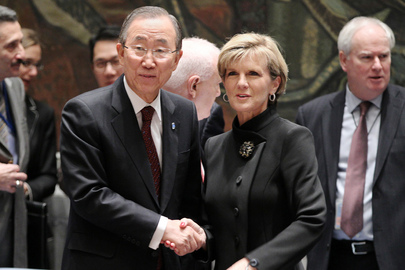3rd December 2014
Successful Australian UNSC Presidency in November
Australia has just completed its second period as UN Security Council Presidency, in November. It’s up to each member how much they want to make of their month of rotating Presidency. So it was good to see Australia being both ambitious and effective. It enabled strategic consideration of some important thematic issues, alongside dealing with regular Council business and responding to external developments.

Australia’s programme included:
- the contribution of policing to successful peacekeeping missions, an area the Council hadn’t paid enough attention to in the past;
- the Council’s use of sanctions, which was overdue for a review and refresh; and
- the growing threat to international security posed by foreign terrorist fighters, which needed further Council attention to build on the debate chaired by President Obama in September.
With two years of experience on the Security Council under its belt now, Australia was able to work well with other members to deliver genuine progress on these issues. Foreign Minister Julie Bishop travelled to New York to energetically chair three meetings. The debate Australia chaired with Heads of UN Police Components was a particularly valuable innovation. Securing a unanimous welcome and accompanying resolution was an impressive feat.
My colleague Mark Lyall Grant, British Permanent Representative to the UN, described the latest Australian Presidency as “a fitting culmination to the energy, creativity and commitment that Australia has brought to Council proceedings over the last two years”. Australia stands down from the UNSC at the end of this month. As a permanent UNSC member and a very close partner of Australia, Britain hopes we won’t have to wait another 30 years to see Australia back on the Council again.